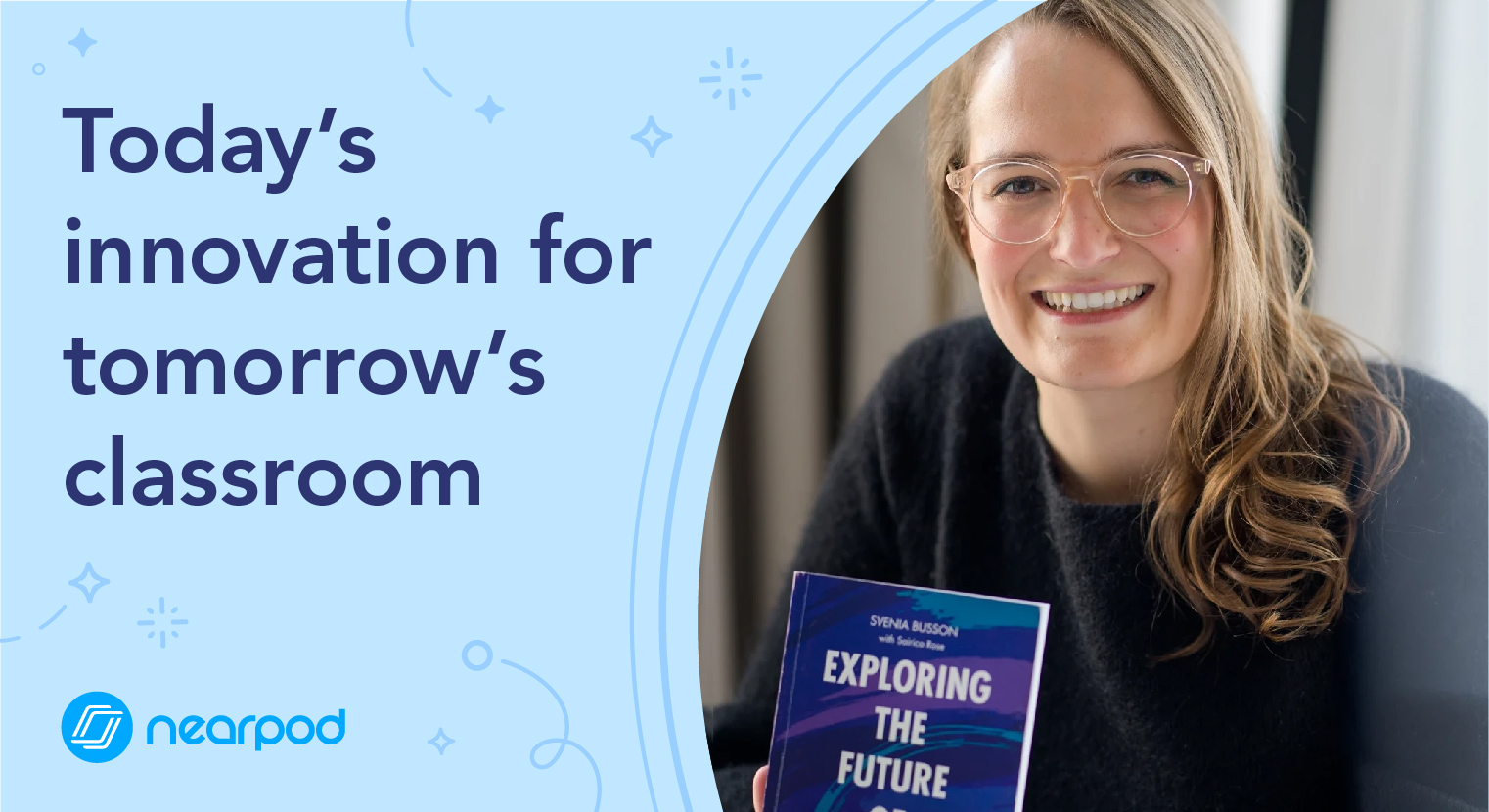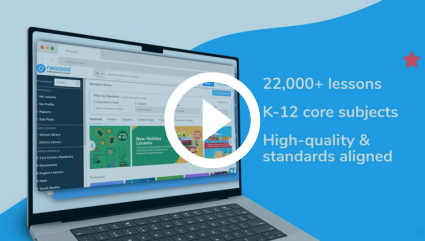
Today’s innovation for tomorrow’s classroom
Svenia Busson is a passionate global learning innovation explorer who embarked upon an EdTech tour of 19 countries to discover and distill the world’s most future-proof teaching and learning practices for tomorrow’s classroom. She is the co-founder of the EdTech France and the European Edtech Alliance, which together represent around 2,500 startups across Europe. She is now building a new Edtech VC fund to support the most promising European Edtech Entrepreneurs.
Svenia’s book ‘Exploring the Future of Education’ encapsulates best practices and top education innovations from around Europe. Fanny speaks to her about how she sees Classroom 4.0.
Going from a synchronicity-based education model to an asynchronous model where hybrid, blended learning opportunities give us much more flexibility and agility in teaching tomorrow’s classroom. Fanny Giuliani, an Account Executive at Nearpod, had the opportunity to chat with Svenia Busson about the future of education.
Fanny: What changes are you seeing in the world’s classrooms?
Svenia: The school simply doesn’t play the same role as it did before. We’re going from a synchronicity-based education model to an asynchronous model where hybrid, blended learning opportunities give us much more flexibility and agility in terms of organizing how we teach and learn.
Some universities are adopting a blended model even if they can reopen. In K-12, this evolution is playing out through the rise in tutoring and peer-to-peer coaching. Tutoring was huge in Southeast Asia yesterday and today it’s huge everywhere. Peer-to-peer startups like Brainly and Socratic are sky-rocketing because students want to have more than one modality. They want to help each other online and to study together. StudyStream has reached three million kids that connect together on a Twitch type of platform. They just look at each other while they’re studying. No one talks. They’re muted and they just look at each other and read together. You have a few teachers here and there, but it’s mostly K-12 students helping each other and autonomously organizing the community.
Fanny: What did the pandemic teach students and educators?
Svenia: A lot of schools went back to class very fast – especially in Europe. In France and Spain, they went back for the 2021-22 academic year. Confinement generated a catastrophe in terms of technological infrastructure. Teachers were not trained for it. Around 15% of students never connected. We need to learn from this and be better prepared for tomorrow’s classroom. There are various plans – like Germany’s Five Billion Digital Pact to train teachers in the use of technology but despite State and policy level changes, many schools just to go back to normal and not talk about digital anymore because it was quite a frightening experience for them.
The GDPR regulations in Europe threw another spanner into the works because the State mandated the use of specific tools but they were too complex for teachers, who ended up using Meet, Teams, and Zoom…
Students, on the other hand, are continuing to use the tools they discovered during confinement. Even if their schools and the system are back to “normal,” the experimental studying and learning methods are here to stay.
I work with a lot of universities and business or engineering schools in Europe that managed the transition quite well. They focus on student wellbeing and how to build tools around that and create focus groups or coaching methods that helped them because they didn’t have the campus experience anymore. Many universities also want to adopt the blended model to save money on renting big spaces.
Fanny: How can we integrate new learning methods?
Svenia: We need to train teachers and develop their digital skills – and governments must invest massively in this. We have an acute shortage of teachers, even in Finland, where becoming a teacher is a dream job. To prepare for tomorrow’s classroom, we need to provide teachers with professional development, value their work, and pay them a decent salary.
There are plenty of tools created to support teachers. But teachers often don’t have the budget for them. Tech startups should focus their communication and marketing efforts on how to help teachers do their job more efficiently and save time. Peer-to-peer teacher communities are also springing up which brings teachers together to exchange experiences and best practices, stimulating professional development and promoting wellbeing. I would like to see some kind of award, perhaps a global teacher prize. It’s really important to put teachers center stage and build great content for them. Nearpod also has a significant global community on social media where teachers exchange best practices, ideas and troubleshoot issues that have come up in today’s classroom.
Fanny: What will we need in tomorrow’s classroom?
Svenia: We need to empower students and shift the focus from teacher-centric to learner-centric. That’s what I do in my work. I train professors and teachers to use new types of pedagogies and not just talk about technology. It’s just a support system. It shouldn’t be visible. It’s not a silver bullet. It should help in the background. What’s key, is how you organize your classroom, how you engage learners to the maximum. Active learning pedagogies are essential, but teachers aren’t trained for that. They often replicate the top-down model they got used to as students themselves. But it’s really about shifting our pedagogical mode into something more active and engaging.
Teachers can’t personalize learning for a class of 30 different kids with 30 different backgrounds but technology can support adaptive learning. It also has a role in enabling peer-to-peer collaboration inside the classroom – which is hugely important. When you look at the World Economic Forum’s Future of Jobs Report, the top 10 skills needed in tomorrow’s workplace include problem-solving, flexibility, adaptability, critical thinking, creativity, empathy… We need to use tools or pedagogical methods that can help teach these skills. When you teach project-based learning, you teach how to work together collaboratively on the project. When you teach problem-based learning, you teach kids how to solve problems. These methodologies are absolutely key to cultivating these types of skills. In Denmark and Finland, there are mandatory courses on empathy in the curriculum. Reaching that level of innovation today is essential for tomorrow’s world.
Fanny: Tell us a bit about your many EdTech hats…
Svenia: I’m a community instigator. When I started EdTech France three years ago, we were four entrepreneurs. Now we are 400. We bring entrepreneurs together to grow to understand the market better. And then we represent them at the public policy level. I did the same with the European Edtech Alliance. My new baby is the Female Edtech Fellowship. I created a business club for women entrepreneurs because only 8% of EdTech startups worldwide are led by women CEOs. I think that’s a catastrophic figure so I created a fellowship to help women founders, to bring them together, around a 6-month program that will hopefully support their growth.
Fanny: You and Nearpod have a lot in common. At Nearpod, we also believe in putting our teachers front and center. We host free training events every year like Camp Engage where we identify innovative teachers and professors from across the globe and they share best practices on how they use Nearpod to engage and inspire their students in the classroom.
You mention project-based learning, problem-based learning, flipped classrooms, gamified learning, and blended learning. These are all topics that teachers have found solutions to through Nearpod and will certainly be the key to maintaining our students engaged in tomorrow’s classroom.
Fanny: Svenia, how can people connect with you?
Svenia: You can find me on LinkedIn or find out more information about my work on Twitter. I’m always open to connecting with new educators and edu-preneurs as I am now building a new Edtech VC fund to support European founders in the field of Edtech!

Account Executive and presenter, Fanny helps educators increase student engagement with Nearpod.



